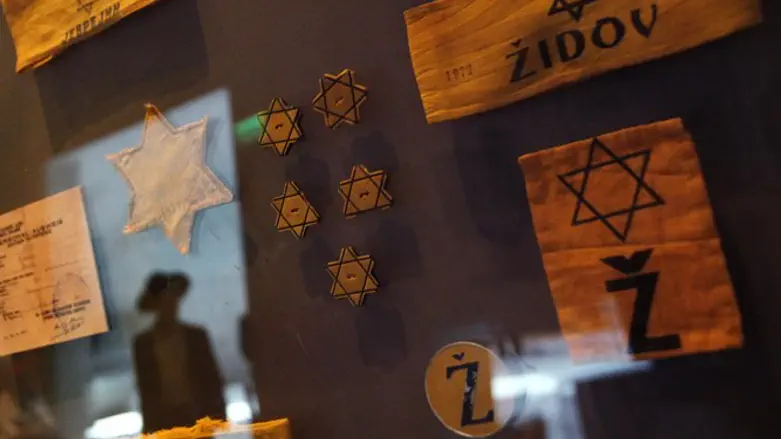
Two municipalities in Portugal opened museums about their Jewish heritage amid protests by residents of the capital Lisbon against the ongoing construction of a third and larger one.
In the northeastern city of Braganca, the municipality last week opened a two-story Sephardi Interpretive Center that focuses on the life of Jews under persecution in 15th and 16th centuries. And on Thursday, a smaller Jewish Memorial Center opened in the town of Vila Cova à Coelheira east of the northern city of Porto.
Separately, the Association for Heritage and Population in Alfama organized a news conference Wednesday to express its opposition to the ongoing construction of the four-story Jewish museum being built in the neighborhood.
The building, which will feature a facade with a large Star of David, “breaks with the neighborhood’s tradition,” a spokeswoman for the residents association was quoted by the Public newspaper as saying in an article about the opposition published Wednesday.
The spokeswoman, Maria de Lurdes Pinheiro, also said residents were not consulted about the plan to erect the Jewish Museum of Lisbon in Alfama. Portuguese Jews had lobbied for decades for the construction of a Jewish museum in Lisbon – one of the few capital cities in Western Europe without such an institution -- until an agreement was reached in 2016.
Pinheiro insisted she does not oppose plans to erect a museum about Jews as such.
“Jewish museum, sure. But not in Sao Miguel Square,” she said in reference to the intended area where the museum is being built. She also said the planned museum does not fit the “atmosphere” of the neighborhood, which is one of Lisbon’s oldest and is considered a tourist attraction for its narrow hillside alleyways, with their many boutique restaurants, leading to the Sao Jorge Castle overlooking the Tejo River.
But Ester Mucznik, the former vice president of the Jewish Community of Lisbon, in 2016 said Alfama and Sao Miguel Square were “symbolic” choices for a Jewish museum because of their proximity to Lisbon’s historical Jewish neighborhood.
The opening last week of the Sephardi Interpretive Center of Braganca was less controversial. Focusing on the history of so-called New Christians – those who were forced to convert from Judaism to Christianity under duress during the Portuguese Inquisition, which began in 1536 – the building’s opening was attended by the mayor and leaders of Portugal’s Jewish community of roughly 1,000 people.
Many of Portugal’s New Christians were refugees from Spain, where the authorities and the Catholic Church began the Spanish Inquisition in 1492. The persecution led to the dispossession and exile of hundreds of thousands of Jews. Many of those who remained for centuries continued to worship according to the Jewish faith in secret. In Hebrew, those who practiced in secret are called anusim – forced ones.
Portugal had its own Inquisition in 1497, this after deporting hundreds of Jewish children to the island of Sao Tome in 1493 where many of them died. 2000 Jews were massacred in Lisbon in 1506 and many were burned at the stake in the country's first auto-da-fe in 1540. In memoriam, the square where this occurred was decreed out of bounds (a kherem, in halakhic language)by the Jewish community.
The two-story museum in Braganca features artworks about the anusim and a large monument in the shape of an olive tree whose branches are emblazoned with the names of locales that had anusim communities.
Jaime Ayash, the vice president of the Jewish community of Lisbon, said the center’s opening was the latest demonstration of modern Portugal’s immunity to rising anti-Semitism elsewhere in Western Europe.
“Jewish culture is popular in Portugal and that’s significant in a world experiencing a wave of anti-Semitic hate,” he said, according to an article published on the website of the TSF radio station.
Separately, the mayor of the town of Vila Cova à Coelheira, where a small Jewish memorial museum opened Thursday, highlighted the touristic value of the new establishment in his address at the opening, according to the news site Aveiro.
In Spain, meanwhile, the mayor of Catsrillo Mota de Judios last month presented to Madrid Jewish leaders his town’s plans to open a museum on its Jewish heritage by 2019.
In 2015, Catsrillo Mota de Judios, which means Castrillo Jewish Hill, changed its name from Catsrillo Mata Judios, which means Castrillo Kill Jews. Historians believe the name remained from medieval times.